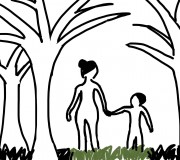We live very far from my home town. I mean very far. As far as we could have gone. I even told my parents when we moved to New Zealand, ‘Look, if we move again we will get closer to you!’. I was born in the northeast of Spain, Catalonia, and New Zealand is completely opposite in the globe.
I always liked adventure, so when the opportunity arose to move to New Zealand I didn’t blink twice and I told my husband ‘of course we are going!’. In the last six years here I have worked, had one child, been a full-time-mom, made some really good friends, bought land, build a house and even applied for citizenship. It looks like we are quite settled. But, are we? In the back of our minds we have always wondered what the future would hold for us, where we would end up living, none of us being born here and actually coming from different parts of the world – my husband is not Spanish.
Lately I have been feeling more strongly than in the past this urge or need to go back to my origins, to connect with my roots again. I have started feeling very strongly that I want to spend quality time with my grandparents, to ask them about their stories, to actually get to know them. And then, I would love for my daughter to connect with her grandparents, her great-grandparents while they are still with us.
Yesterday a friend wrote something in her facebook wall that is so appropriate here. We all have heard that home is where your heart is but she said her heart was split into so many places all over the world. It has been subtle for me but it is getting stronger. Whatever we end up doing we will leave amazing friendships behind, or loved family members. Although this is quite usual for some – my husband’s family live scattered in the US and they moved even over oceans when he was a child – , my family didn’t move much, all of them still live where they were born or close by, all of them in the same place or not far. This makes me feel a very strong connection to the place where I lived for all my childhood and teen years, where all my family still is, and some childhood friends too. And even though I have thought for a long time that I wouldn’t go back, that adventure lied ahead, I am not that sure anymore. The ‘never say never’ saying is resonating in my ears these days, when I wonder where home is and where I would like to be now.
Is this part of getting older? Does it come with having kids? Has it just come down to me now who I am and where I come from? I don’t know, but lately I have found other people in similar situations. We all followed adventure and/or love, we all crossed oceans, but there is always a voice calling us back. Whether we finally go back or not is another story thought. Are we going to go back? Maybe, maybe not. But now I also wonder how it will be for her, our daughter. She was born in New Zealand but she doesn’t have extended family here, although she would definitely leave good friendships behind if we decided to leave. Would she feel a strong connection with this marvellous land in the antipodes even if we went back to Europe? Would she have the need to come back later in her life to figure out the same questions I am now pondering for myself? Whatever we do, New Zealand will definitely be part of her and her story, and ours too, and it has definitely been home for us and it still is, while we try to find out what the future holds.


 I used to be a bit averse to my daughter getting very dirty. I suffered for her clothes, for having to give her a bath afterwards, for the house. My priorities have change and for that I have to thank, among other things, Playcentre. This is quite a unique organisation of early childhood education centres run by parents, set up in New Zealand many years ago. I learned a lot just attending one of the centres but best of all, they offer free education for families in order to learn all together and have the knowledge to contribute running the centres.
I used to be a bit averse to my daughter getting very dirty. I suffered for her clothes, for having to give her a bath afterwards, for the house. My priorities have change and for that I have to thank, among other things, Playcentre. This is quite a unique organisation of early childhood education centres run by parents, set up in New Zealand many years ago. I learned a lot just attending one of the centres but best of all, they offer free education for families in order to learn all together and have the knowledge to contribute running the centres.
